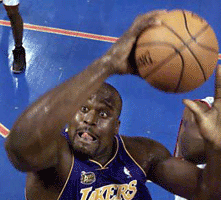
|

|
Jewish World Review Feb. 12, 2002 /Rosh Chodesh Adar, 5762
http://www.jewishworldreview.com --
THE critics are coming down harder on him than the arms of Charles Oakley and Brad Miller. These appendages recently crashed down on Shaq's head, provoking him to throw a punch that just missed landing Miller in the obituary column. Oakley and Miller were charged with flagrant fouls; Shaq drew a three-game suspension.
Virtually everyone agrees that teams that are clueless as to how to contain
the "big fella" have hit on a common strategy: Keep fouling the guy
intentionally, often hitting him pretty hard, and rely on his poor free-throw ability.
The critics divide into roughly two camps. One holds that Shaq was wrong
but that various third parties -- inconsistent referees, blood-thirsty fans,
myopic league officials -- bear some of the guilt. The other maintains that Shaq
was wrong but that, hey, what could he do? There comes a point where a man has
to reclaim his self-respect and not let people "dis" him.
Shaq may not have been wrong at all, although for a different reason. Jewish
law has a long tradition of highly nuanced, but more compassionate, treatment of
victims of violence who retaliate with force. To be sure, verbal provocation
is never sufficient for using physical force, unlike the American "fighting
words" doctrine.
On the other hand, a victim of physical force who immediately responds is
held blameless for harm that he or she may inflict, even if it is somewhat out
of proportion. This dispensation was recorded more than 600 years ago and is
based on a tightly reasoned reading of a 3rd century Talmudic text.
Sixteenth century authorities championed competing theories behind the
dispensation granted the retaliator. They described both self-help (warding
off continued aggression) and heat-of-passion (justified loss of control)
defenses for retaliation, with subtle differences between them. The self-defense
argument ceases immediately after the aggressor fully ceases his or her attack; the
heat-of-passion defense applies somewhat longer.
Most remarkable, perhaps, is the formulation of Rabbi Solomon Luria in that
century. The retaliator is not supposed to use greater force than is
necessary or continue to use force once he has extricated himself from the danger
of further harm.
Nonetheless, writes Rabbi Luria, if he should continue to pummel his adversary
even after his adversary no longer threatens further harm, he is not to be
regarded as an evil person for acting on justifiable rage. He is, however, liable
for damage that he causes by continuing to apply force to the aggressor who no
longer poses a danger.
On the other hand, if he reacts to an act of aggression with disproportionate
force applied immediately -- in one blow fracturing the skull of someone who
simply punches him -- he is entirely exempt from liability. It is unrealistic,
Rabbi Luria argues, to demand that the victim precisely weigh his response.
Besides, he argues, the victim is entitled to ensure that the aggressor will not come
back for a second round.
The retaliating party is liable only if it is clear to everyone that he used force gratuitously after all threat had been eliminated, as the jury believed in the recent hockey-dad case.
Jewish law, it seems, does not view Shaq as an evildoer. It simply accepts
his reaction as part of the expected behavior of otherwise good human beings
when they get hit. His reaction might not be commendable, but it cannot be
dismissed as blatantly out of bounds.
This might surprise most, especially those with wider familiarity with
Jewish values. Jewish sources, after all, treat even raising one's hand to strike
another as the sure mark of an evil person, let alone delivering the blow.
They prohibit revenge or even harboring a grudge. They encourage those who are
disparaged and shamed to bear their shame silently and laud as heroic those
who resist the temptation to respond in kind. Why does the retaliator escape the
wrath of the law?
A turn-of-the-20th-century Jewish authority, Rabbi Yisrael Meyer Kagan,
offers a suggestion that provides a slam-dunk resolution to this tension. Jewish law
encourages -- demands, actually -- that people go beyond the letter of the law
and live by a higher ethic. Why not, then, sweep the law into the background and
just focus on the more-elevated standard?
Because, explained Rabbi Kagan, when it comes to someone else's behavior, we never
should expect more than black-letter law. Our own conduct, however, should
be informed by a higher ethic, never contenting itself merely with what the law
requires. But that same law always can be relied on to separate the good
guys from the bad. If someone complies with the law, we should view him or her as
a good person. We can hope for better but never should demand more of anyone
other than ourselves.
The law -- Jewish law, at least -- fixes affirmative responsibilities in order
to make better people out of good people. But it also sets minimal standards
that describe what good people may do under stress and still avoid punishment and
condemnation.
By these rules, we must conclude that those who liked Shaq before the
incident have no reason to change their opinion. What we should change is what we
expect from others. By embracing the standard of law, we will have more reasonable
expectations of others and often bring peace and healing to a community of
imperfect

Fouling out on
a Higher Court
If Los Angeles Lakers superstar Shaquille O'Neal needs to improve his
defense, he might try Jewish law.
By Rabbi Yitzchok Adlerstein with Rabbi Michael Broyde
JWR contributor Rabbi Yitzchok Adlerstein holds the Sydney M. Irmas Chair in Jewish Law and Ethics at Loyola Law School. Rabbi Michael Broyde is associate professor of law at Emory Law School. Comment by clicking here.
